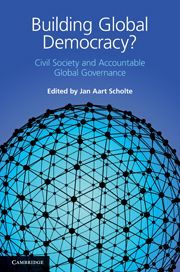Book contents
- Frontmatter
- Contents
- List of figures
- Participants in the Gothenburg Workshop
- List of contributors
- Editor's acknowledgements
- List of abbreviations
- Introduction
- 1 Global governance, accountability and civil society
- 2 Civil society and accountability of the United Nations
- 3 The World Bank and democratic accountability: the role of civil society
- 4 Civil society and IMF accountability
- 5 Civil society and the WTO: contesting accountability
- 6 Civil society and accountability in the Commonwealth
- 7 The Organisation of the Islamic Conference: accountability and civil society
- 8 Civil society and patterns of accountability in the OECD
- 9 Civil society and G8 accountability
- 10 Structuring accountability: civil society and the Asia-Europe Meeting
- 11 Civil society and accountability in the global governance of climate change
- 12 Civil society and accountability promotion in the Global Fund
- 13 Accountability in private global governance: ICANN and civil society
- 14 Civil society and the World Fair Trade Organization: developing responsive accountability
- Conclusion
- Bibliography
- Index
8 - Civil society and patterns of accountability in the OECD
Published online by Cambridge University Press: 05 June 2012
- Frontmatter
- Contents
- List of figures
- Participants in the Gothenburg Workshop
- List of contributors
- Editor's acknowledgements
- List of abbreviations
- Introduction
- 1 Global governance, accountability and civil society
- 2 Civil society and accountability of the United Nations
- 3 The World Bank and democratic accountability: the role of civil society
- 4 Civil society and IMF accountability
- 5 Civil society and the WTO: contesting accountability
- 6 Civil society and accountability in the Commonwealth
- 7 The Organisation of the Islamic Conference: accountability and civil society
- 8 Civil society and patterns of accountability in the OECD
- 9 Civil society and G8 accountability
- 10 Structuring accountability: civil society and the Asia-Europe Meeting
- 11 Civil society and accountability in the global governance of climate change
- 12 Civil society and accountability promotion in the Global Fund
- 13 Accountability in private global governance: ICANN and civil society
- 14 Civil society and the World Fair Trade Organization: developing responsive accountability
- Conclusion
- Bibliography
- Index
Summary
Introduction
In the late 1990s the Organisation for Economic Co-operation and Development (OECD) became widely known among civil society associations and the general public for its role in the failed negotiations for a Multilateral Agreement on Investment (MAI). The MAI project was heavily criticised, and some depicted the OECD as a remote and secretive body that was concocting ultra-liberal global policies on behalf of transnational capital in isolation from the public interest.
There are several somewhat ironic aspects to this story. One is that the OECD has almost since its inception regularly included some civil society organisations in its work. Another is that the MAI process was an atypical experience, with little resemblance to normal OECD activities. Nevertheless, the affair triggered a process of internal reflection and review of practices, which led to greater civil society involvement in major aspects of the organisation's work (OECD 2006a). Six years later an institution that had been so heavily criticised emerged as one of the top accountability performers among intergovernmental organisations in the 2006 Global Accountability Report compiled by the One World Trust (Blagescu and Lloyd 2006: 52).
What role has civil society played in accountability at the OECD? In what ways and to what extent have civil society organisations (CSOs) promoted transparency, consultation, evaluation and redress vis-à-vis affected publics of this Paris-based global governance agency?
- Type
- Chapter
- Information
- Building Global Democracy?Civil Society and Accountable Global Governance, pp. 163 - 181Publisher: Cambridge University PressPrint publication year: 2011
- 3
- Cited by



